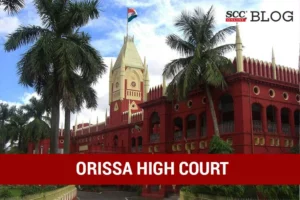Orissa High Court: In an application made under Section 482 of the Code of Criminal Procedure, 1973 (‘CrPC’) for quashing the criminal proceedings against a doctor (‘applicant’) for offence under Section 304-A of the of the Penal Code, 1860 (‘IPC’), G. Satapathy*, J. dismissed the applicant’s application.
Factual Matrix
In the matter at hand, the applicant is a doctor who was associated with Bhubaneswar Municipal Corporation Hospital (‘BMC Hospital’). The deceased was admitted to the BMC hospital on 01-07-2009 and was under the treatment of the applicant. The deceased’s uncle requested a blood transfusion as the deceased was having low haemoglobin and her condition was getting worse, but the applicant assured for blood transfusion on 02-07-2009. However, the condition of the deceased deteriorated and became serious at around 11:00 pm and the deceased died an unfortunate death in the midnight due to applicant’s negligence as the applicant did not attend to the deceased immediately.
A First Information Report (‘FIR’) was instituted against the applicant for offence under Section 304-A of the IPC and subsequently a chargesheet was filed. Hence, the present application was filed for quashing the said criminal proceedings.
Decision
The Court perused Section 304-A of the IPC and said that for the purpose of attracting Section 304-A of IPC, the following ingredients are required: (i) There must be death of a person in question; (ii) The accused must have caused such death; and (iii) Lastly such act of the accused was rash and negligent, and it did not amount to culpable homicide.
The Court said that prima facie the material on hand disclosed the allegation of medical negligence against the applicant. The Court stated that “negligence is a breach of duty imposed by law and it may be either civil or criminal depending upon the nature and gravity of the negligence. Criminal negligence, on the other hand, is gross and culpable, neglect or failure to exercise, reasonable and proper care and precaution to guard against injury, either to the public generally or to an individual in particular. In criminal cases, the magnitude and degree of negligence are determinative factors. Besides, there must be mens rea in criminal negligence, which shall be of such nature to the utter disregard to the life and safety of others so as to amount a crime”.
The Court referred to Suresh Gupta (Dr.) v. Govt. of NCT of Delhi, (2004) 6 SCC 422, wherein, it was held that, for fixing criminal liability on a doctor or Surgeon, the standard of negligence required to be proved should be so high as can be described as ‘Gross Negligence’ or ‘Recklessness’. It is not merely a lack of necessary care, attention and skill.
Further, the Court relied on Jacob Mathew v. State of Punjab, (2005) 6 SCC 1, wherein it was observed that “a private complaint may not be entertained unless the complainant has produced prima facie evidence before the Court in the form of a credible opinion given by another competent doctor to support the charge of rashness or negligence on the part of the accused doctor. The investigating officer should, before proceeding against the doctor accused of rash or negligent act or omission, obtain an independent and competent medical opinion preferably from a doctor in government service, qualified in that branch of medical practice who can normally be expected to give an impartial and unbiased opinion”. The Court said that on applying the said parameters to the case at hand, and on the basis of the material collected during the investigation, there appears prima facie case against the applicant.
The Court noted that the other doctor on duty on the relevant night, had disclosed in the chargesheet that despite her repeated telephone request between 10:45 PM to 12:25 AM to take proper action, the applicant refused to come to attend the deceased, rather replied over telephone only to shift the deceased to any private nursing home.
The Court said that the position of a doctor in India as accepted by public generally is next to God, but there are certain instances of course a few in number, where the medical practitioners are acting in utter disregard to human life in expectation of pecuniary advantage to malign in the noble profession. Further, the Court added that a doctor is always expected to treat or aid the patient to the best of his knowledge and ability without any material expectation which is why renders such profession as noble and they are considered as emissary of God in our country. It is true that no sensible professional, particularly a doctor would intentionally commit an act or omit to do an act which would result in loss of life. A medical practitioner faced with an emergency situation would definitely try his level best to treat the patient and ordinarily could not leave his patient to die.
The Court said that the applicant had not made out a case to show that the criminal proceeding instituted against him in the aforesaid case was an abuse of process of Court, hence, the application under Section 482 of the CrPC was dismissed.
[Biswa Mohan Mishra v. State of Odisha, 2023 SCC OnLine Ori 5433, Decided on: 14-08-2023]
*Judgment Authored by: Justice G. Satapathy
Advocates who appeared in this case :
For the applicant: Senior Advocate M.K. Mishra;
For the respondent: Additional Government Advocate S.S Pradhan.

